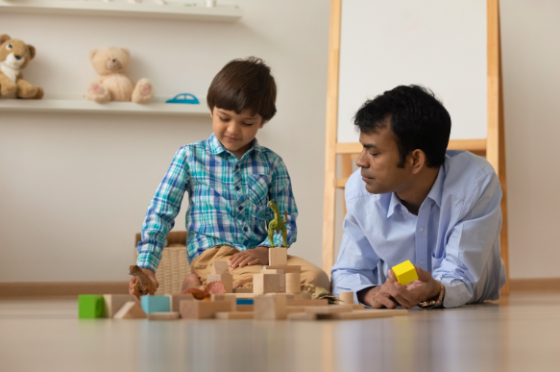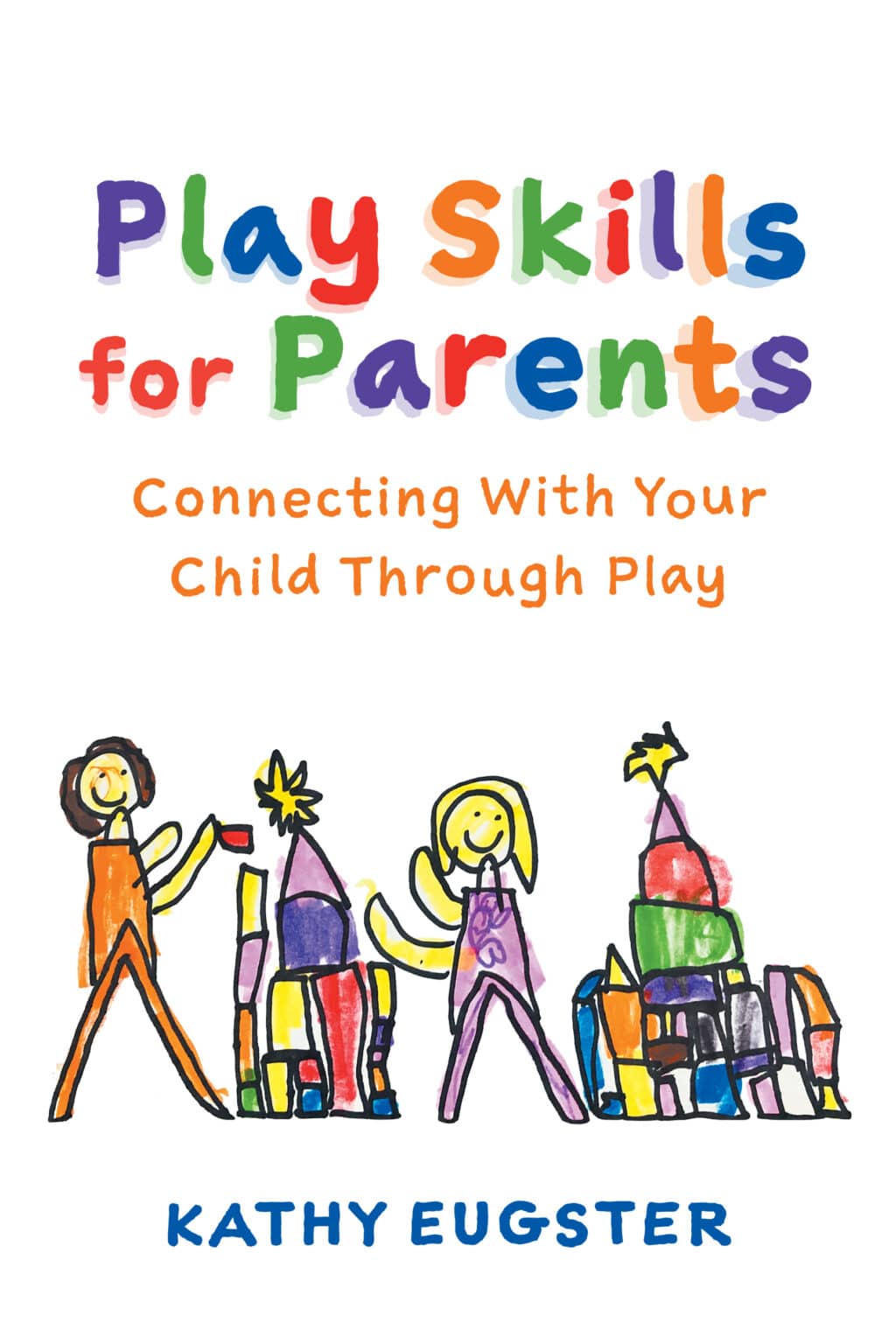Written by Kathy Eugster, MA
We are learning from the fields of neuroscience and child-development how important it is for parents to play with their kids. That children need many positive, face-to-face interactions with attentive, sensitive, and responsive parents or caregivers for healthy brain and nervous system development. Play activities between parent and child are excellent ways to provide these necessary interactions to children.
Parent-child play offers unique benefits to children over children’s peer play or independent play because parents are older and wiser and can support their child’s development in a variety of different ways. Many research studies have found that play between a parent and child is one of the best ways to strengthen the parent-child relationship.
BOOK REVIEW by Lorrie Holmes
I absolutely loved this book as both a parent and also as an Early Childhood Educator. There is so much information – including samples to follow – on every aspect of how to connect with your children through play. I would say it almost reads as a manual, it’s so informative and comprehensive! I found it especially helpful to remind me to always keep in mind when to allow the child to direct their play, and when to step in – if only for a moment – to direct the play in order to offer support and a possibly needed intervention for safety purposes – and when to use appropriate parent-directed play. I also found it very helpful to learn when I need to step back and allow the child to direct the play and sometimes this isn’t as clear as you might imagine. I would highly recommend every parent/caregiver and early learning professional to read this book and take it all in, chapter by chapter!

Here are 5 Tips for How To Strengthen Your Parent-Child Relationships

1. Engage in Child-Directed Play
During playtime, give your child lots of opportunities to make their own choices and decisions, or in other words to lead the play. This style of play is called child-directed play, where parents let their children decide what and how to play. Recently, child health professionals have encouraged parents to provide more opportunities to their children for unstructured, free, or child-directed play as opposed to more structured activities.
Many parents are unfamiliar with the concepts of child-directed play, and one of my goals is to help parents learn how to engage with their child in in child-directed play. Here are a few key points:
- Refrain from telling your child what to do, offering suggestions, making judgements, asking questions, or directing your child in any way
- Describe objectively what you notice your child doing
- Paraphrase what your child is telling you
- Identify any feelings coming up for your child
- Don’t “jump in” too early to do things for your child
2. Provide Guidance Through Parent-Directed Play

When necessary, support your child by structuring the playtime to meet your child’s needs. I call this style of play parent-directed play, which is fundamentally different than child-directed play. With parent-directed play, you engage, guide, and regulate your child through fun play activities.
For example, you may want to help your child remain emotionally regulated, so you would structure a play activity that helps to develop self-regulation skills. You may want to encourage your child to be more active physically, so you would initiate some kind of active play with your child. You may want to help your child with listening and impulse control, so you would structure a play activity than would encourage these skills.
With parent-directed play, maintain a playful attitude to keep your child engaged and regulated. This is not the time for formal teaching and learning, however, with your guidance, children can learn and develop important skills through play.

3. Limit Unsafe and Destructive Behaviours
In both child-directed and parent-directed play, it is the parent’s responsibility to keep the playtime safe. Set limits for unsafe and destructive behaviors, for example, no hitting or kicking, or no throwing hard objects. Parents may need to remind children more than once of what the limits are for safe play, and that’s okay, you are just helping your child learn what are appropriate and inappropriate behaviours.
If your child consistently breaks the limits, you can provide your child with a warning of a possible consequence that would happen the next time the inappropriate behavior happens, such as taking a toy away or ending a play activity. The important thing to remember is, once you give a warning of a consequence, you must be prepared to carry out the consequence the very next time the inappropriate behaviour happens, otherwise giving warnings of consequences becomes meaningless.
4. Put A Time Limit on Playtime

During playtime, parents need to provide their full and uninterrupted attention to their child, meaning no distractions such as phones, other adults, or work activities. Putting a time limit on playtime provides some structure and makes it more manageable to be fully present and attentive to your child for the full playtime period.
Ideally, parents should have at least one thirty-minute play session per week with their child. Keep in mind however, that shorter playtimes of even five to ten minutes can also be very effective and can easily be interspersed throughout the day. Remember to position yourself appropriately to your child during playtime and don’t forget to make eye contact and smile.

5. Provide Interesting Play Objects
Playtime can take place indoors or outdoors. The best play objects or toys are open-ended, meaning they can be used in a number of different ways. Children love to pretend, so objects do not necessarily need to look realistic. For example, a stone could represent a person or a box could represent a car.
Have a variety of different types of toys available from various toy categories such as miniature people or animals, toy vehicles, real-life toys such as kitchen or doctor sets, dress-up items, active play items, building toys, and basic arts and crafts items. Simple household objects such as boxes and food containers are very useful in playtime. Also, natural objects such as stones, sticks, shells, leaves, sand, and water are very fun for children.
It is not the number or particular brand of toys you have available for your child that is important. Good play objects do not need to be fancy or expensive. And please remember, you are your child’s best toy!
ABOUT THE AUTHOR
My name is Kathy Eugster and I am a retired Child and Family Therapist and Certified Play Therapist. I am also a parent and grandparent myself.
For close to 20 years, I provided counselling and play therapy services to children, mainly between the ages of 3 to 10 years old, and their families. During that time, I saw many young children with challenging emotional and behavioral problems. Not only did I work to help the child heal and recover, I also worked with the child’s parents or caregivers to support them in supporting their child.
After retiring, I was inspired to help parents in general learn some effective ways to play with their children. I am passionate about helping parents to connect more deeply with their children and also to support their child’s healthy growth and development. Not only that, I also wanted to help parents enjoy playing with their children!
My goal with creating my website, www.pacificspiritplay.com is to make resources on parent-child play available to a wide range of parents, caregivers, and professionals.
Are you an Early Learning Professional, Child Development Expert, Youth Change-Maker or a Children’s Author and have a book you would like reviewed by us? If so, check out our Book Review Guidelines here!


